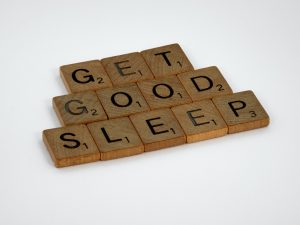
Let me start by wishing you a good night’s sleep tonight! According to science there are not many other wishes that can trump this one…
In his bestselling book about sleep, Matthew Walker, neuroscientist and the director of the Center for Human Sleep Science at the University of California, puts together a compelling case for the importance of sleep. Indeed, Walker challenges the reader to investigate ’why we sleep’. Just think about it: during sleep any creature becomes more vulnerable and an easy pray for its predators… yet, despite this big risk to survival, sleep seems to be a universal behavior preserved from an evolutionary standpoint that can be found in pretty much every living organism. It is fair to conclude that in some respect, sleep is vital and beneficial for us.
Matthew Walker’s own research and comprehensive overview of this field of expertise suggests that sleep is important in ALL respects, as it affects system wide states and changes in the organism, it affects the entire body and brain. For example, it is known that good sleep is enhancing memory and creativity, it helps to manage stress and be emotionally stable, it keeps us looking younger and healthier. As professor Walker puts it, ‘Sleep is the single most effective thing you can do to reset the health of your brain and body´. Poor sleep is likewise overarching, but in detrimental ways. Sleep loss weakens our mental abilities, immune system, and contributes to countless physical and mental disorders and diseases. Lack of sleep literally makes our lives shorter.
Given all that scientific knowledge, it would be naive and ignorant to view the topic of sleep as purely a personal matter. In the realm of global business, with its focus on productivity, innovation, and talent retention, sleep becomes a business case. In a relevant review article, researchers Christopher Barnes and Nathaniel Watson indicate the detrimental influences of impaired employee sleep on their health- and performance-related outcomes, including interpersonal outcomes. In other words, employees with poor sleep have higher absenteeism due to health problems, have lower work engagement and satisfaction, lack creativity, make more performance-related errors, and are less effective in their workplace collaboration with others. Sleep deprived leaders exhibit more abusive supervision practices already after one night of poor sleep, and are generally less charismatic, inspirational, and effective.
What is especially interesting about this review paper is that apart from these predictable influences of poor sleep, the authors also point to specific work characteristics, which contribute to impaired sleep. These work characteristics are both job set-up and workplace culture related. For example, in multinational organizations several practices are adapted to fit different time zones of their global operations, clients or business partners, such as employees being expected to travel across several time zones, participate in early-morning or late-night conference calls, and be available on the phone or via e-mail at any time. Naturally, such practices pose considerable challenges to uphold healthy sleep habits. Moreover, I believe that in many cases, the scientific case for better sleep can stumble upon unhealthy norms, which glorify long working hours and a lack of sleep. Don’t we all occasionally explain our consecutive cups of coffee to our co-workers by proudly stating that we have been working on this project all night long… And didn’t Winston Churchill sleep just 5 hours a night?!
In another article by Christopher Barnes and Gretchen Spreitzer in MIT Sloan Management Review, the authors argue that sleep is indeed a strategic resource for businesses, hence there should be targeted practices to protect and preserve sleep within organizations. According to the theory of planned behavior, our intention for action and action itself are preceded by subjective norms, hence the efforts for better sleep should start with creating a culture that values sleep. Instead of positively reinforcing productive, yet exhausted individuals, it should become a norm to appreciate well rested employees and support priorities around rest and sleep. In practical terms it means introducing new work routines around the core work hours and activities (e.g. no e-mails after 5 p.m., no ‘always on call’ expectations), less scheduled and shift work, more wellness related initiatives (e.g. meditation classes, nap rooms), more scheduled rest after jet-lagged travel, etc. All in all, the bulk of scientific knowledge about sleep suggests that instead of another productivity enhancing seminar, businesses will reap more benefits by just allowing their employees to sleep. In that sense – sleep well!

